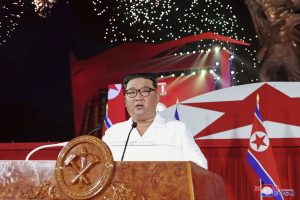In a speech on Wednesday, North Korea’s supreme leader Kim Jong Un denounced South Korean President Yoon Suk-yeol and his military for their actions in confronting his country’s nuclear and missile threats, calling his approach “suicidal.”
“If the south Korean regime and military ruffians think about confronting us militarily and that they can neutralize or destroy some parts of our military forces preemptively by resorting to some special military means and methods, they are grossly mistaken!” the North’s state-controlled media Korea Central News Agency (KCNA) quoted Kim as saying in his speech at the 69th anniversary of the armistice for the 1950-53 Korean War.
Since he took office in May, Yoon has reiterated the importance of strengthening military ties with the United States and its allies to cope with North Korea’s nuclear and missile threats. During his presidential campaign, Yoon brought up the possibility of striking North Korea preemptively when there is an explicit sign of Pyongyang launching missiles toward the South’s soil. Also, he once said that he would ask the U.S. to redeploy tactical nuclear weapons to South Korea or sign a nuclear-sharing agreement. However, Washington killed this initiative right away and Yoon has not spoken about tactical nuclear weapons or nuclear sharing again.
Such remarks were interpreted as political rhetoric to garner support from South Korean conservatives as the U.S. has not supported such moves on the basis of its extended deterrence policy. Also, it is impossible for South Korea to redeploy tactical nuclear weapons or develop its own indigenous nuclear programs as it is a member state of the Non-Proliferation Treaty.
However, Yoon’s military has been working to readopt the “three-axis” defense system, which includes preemptive strike scenarios against North Korea. Kim directly called this a “very dangerous self-destructive action.”
“Such a dangerous attempt will be punished at once by a powerful force and Yoon Suk Yeol regime and its army will be annihilated,” Kim said.
Hours after KCNA published the transcript of Kim’s speech, the South Korean Presidential Office of National Security expressed “deep regret” over Kim’s direct criticism of Yoon, saying that the government is holding a strong and effective readiness posture against any provocation from North Korea. While reiterating its stance to strengthen its self-defense under the ironclad military alliance with the United States, Seoul urged Pyongyang to return to dialogue for denuclearization and peace construction.
Washington and Seoul have not ruled out diplomatic overtures on North Korea issues. However, since then-U.S. President Donald Trump walked out of his 2019 summit with Kim in Hanoi, North Korea has been crystal clear that it will only consider returning to the negotiating table once Washington makes concessions first.
Yoon has said that his administration will be ready to propose an “audacious plan” to help North Korea revive its devastated economy if Pyongyang steps forward to denuclearize the country. He also expressed his willingness to coordinate this plan with the U.S.
However, Kim likely views denuclearization as a suicidal move, as there is no reason to fear a Pyongyang with no nuclear weapons. Kim has never expressed interest in Yoon’s “audacious plan” but ignored it by continuing the power game.
American and South Korean negotiators urged Pyongyang to return to the table without any conditions, but the leaders of the two countries have implied that the dovish overtures could be made when North Korea gives up its nuclear weapons – which is the old school policy that has long failed to entice North Korean leaders to denuclearize the country.
Kim pointed to the South Korea-U.S. joint military exercises as proof of the so-called “double standard” of the United States. He also accused the U.S. of demonizing his country to justify its “hostile” policies toward his country.
The South Korea-U.S. joint military drills, one of the “hostile” policies that North Korea has demanded Washington withdraw, are expected to be held in late August. Compared with the previous military drills for the past few years, the upcoming military drills are going to be conducted on a larger scale. Both Seoul and Washington have raised the necessity of reinvigorating the drills in a bid to respond to the unprecedented spate of the North’s missile tests this year.
Months ago, U.S. F-35 stealth fighter jets were deployed in the region and conducted drills with the South Korean military. As more and more powerful U.S. weapons are expected to be deployed for the joint military drills, even while North Korea is preparing to conduct its seventh nuclear test, the arms race on the Korean Peninsula will intensify in the coming months.

































